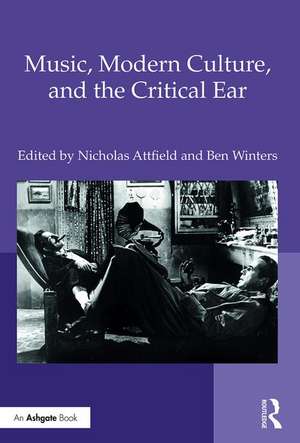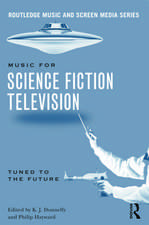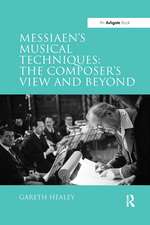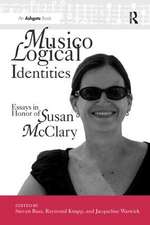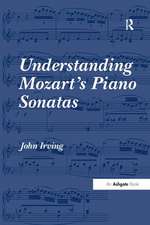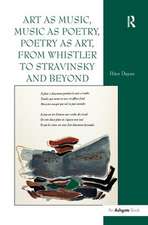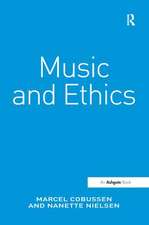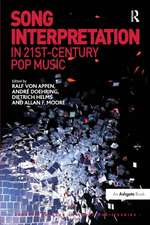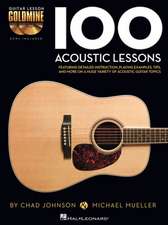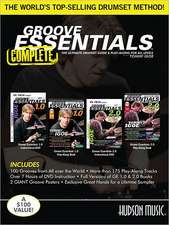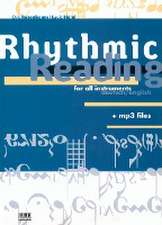Music, Modern Culture, and the Critical Ear
Autor Nicholas Attfield, Ben Wintersen Limba Engleză Hardback – 17 noi 2017
| Toate formatele și edițiile | Preț | Express |
|---|---|---|
| Paperback (1) | 260.13 lei 43-57 zile | |
| Taylor & Francis – 12 dec 2019 | 260.13 lei 43-57 zile | |
| Hardback (1) | 764.20 lei 43-57 zile | |
| Taylor & Francis – 17 noi 2017 | 764.20 lei 43-57 zile |
Preț: 764.20 lei
Preț vechi: 1102.79 lei
-31% Nou
Puncte Express: 1146
Preț estimativ în valută:
146.28€ • 158.94$ • 122.95£
146.28€ • 158.94$ • 122.95£
Carte tipărită la comandă
Livrare economică 21 aprilie-05 mai
Preluare comenzi: 021 569.72.76
Specificații
ISBN-13: 9781472476869
ISBN-10: 1472476867
Pagini: 288
Ilustrații: 14 Line drawings, black and white; 16 Halftones, black and white; 4 Tables, black and white; 34 Illustrations, black and white
Dimensiuni: 156 x 234 x 24 mm
Greutate: 0.45 kg
Ediția:1
Editura: Taylor & Francis
Colecția Routledge
Locul publicării:Oxford, United Kingdom
ISBN-10: 1472476867
Pagini: 288
Ilustrații: 14 Line drawings, black and white; 16 Halftones, black and white; 4 Tables, black and white; 34 Illustrations, black and white
Dimensiuni: 156 x 234 x 24 mm
Greutate: 0.45 kg
Ediția:1
Editura: Taylor & Francis
Colecția Routledge
Locul publicării:Oxford, United Kingdom
Cuprins
Introduction. Nicholas Attfield and Ben Winters Section 1: Personal Tributes 1. Susan McClary, ‘Peter Franklin’s Guilty Pleasures’ 2. Kate Daubney, ‘From Opera House to Cinema: Forging a New Discipline in 1988’ Section 2: Modernism and Modernity 3. Sherry Lee and Thomas Peattie, ‘Extraordinary Listening (Mahler – and Franklin)’ 4. Ben Winters, ‘Korngold’s Violanta: Venice, Carnival, and the Masking of Identities’ 5. Jonathan Hicks, ‘Erik Satie and the Subject(s) of Mobility’ Section 3: Reconsidering Interwar Germany 6. Nicholas Attfield, ‘Ein Menschenherz geopfert – oder viele!’: Hans Pfitzner and the Idea of a Volksoper’ 7. Matthew Werley, ‘The Architecture of Trauma: Richard Strauss, Salzburg, and the Great War’ 8. Alexander Binns, ‘Cozarinsky’s La Guerre d’un seul homme and Musical Categories: (Re)-Framing Pfitzner, Strauss, Schreker, and Schoenberg Cinematically’ Section 4: Musicology and its Values 9. Christopher Chowrimootoo, ‘"Britten Minor": Constructing the Modernist Canon’ 10. Aidan J. Thomson, ‘Elgar’s Part-Song Cycle, Op. 53: Idealism and Education’ 11. David Cooper, ‘"It must be done fresh and new"—Bernard Herrmann’s Score for North by Northwest’ 12. Christopher Morris, ‘Back from the Dead: Kubrick, Music and the Auteur’
Notă biografică
Nicholas Attfield is a lecturer in Music at the University of Birmingham. His research interests centre on the European music, culture, and politics of the late nineteenth and early twentieth centuries and he has published on Bruckner, Orff, Pfitzner, Debussy, and music criticism during the First World War.
Ben Winters is a lecturer in Music at The Open University, UK. He is the author of two monographs on film music, and co-editor of The Routledge Companion to Screen Music and Sound. He is a series editor for the Ashgate Screen Music Series.
Ben Winters is a lecturer in Music at The Open University, UK. He is the author of two monographs on film music, and co-editor of The Routledge Companion to Screen Music and Sound. He is a series editor for the Ashgate Screen Music Series.
Descriere
Peter Franklin’s The Idea of Music: Schoenberg and Others set a challenge for musicology: how best to talk and write about the music of modern European culture that fell outside of the modernist mainstream? Thirty years on, Franklin’s students and colleagues return to that challenge and the vibrant intellectual field that has since developed. Moving freely between insights into opera, Volksoper, film, festival, and choral movement, and from the very beginning of the twentieth century up to the 80s, its authors listen with a ‘critical ear’, siting these phenomena within modern cultural practices. This perspective enables them to exercise a disciplinary self-awareness after Franklin’s manner.
